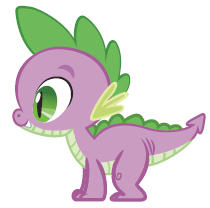Spike says "Hi"

Despite the nature of the show, there are a number of useful lessons we can learn from it, especially with characterization. Humans naturally anthropomorphize our conceptions of other creatures. We do so, because it's really difficult and not particularly interesting to try to understand aliens who are fundamentally alien.
Therefore, there is no point to, and negative utility from, trying to conceptualize an "alien" drake by virtue of its race or inherent attributes. However, looking at My Little Pony, we can map archetypes onto each other. While Spike may appear to be a dragon, his visual cues and behaviour seems remarkably dog-like, thereby resonating with common human-mapped perceptions of dog behaviour like "Loyalty."
Happily, this exact same trick can be used here. Most of the attributes we ascribe to dragons are functionally taken from eagles. Splendor, vanity, power, and wisdom are all trivially mappable onto the archetype of "Eagle" and "Dragon" alike.
Therefore, consider the shared cultural archetypes the players in your LARP have (just basic animal ones for now) and figure out what traits you want to evoke. Sly dragons map quite easily to the "cat" archetype. Lounge, express sibilants (though don't hiss them), and express cat behaviour while calling it "dragon." So long as you don't actually purr, you'll evoke "cat" without being "cat." And therefore lend those aspects to "dragon" which we don't have many useful shared cultural assumptions about anyways.
From a perspective of the game, haughty arrogance isn't particularly fun. To make an engaging NPC, especially an engaging rubber-forehead alien NPC, make sure you choose personality traits from animals that are generally approachable. These traits combined with liberal plot hooks will make people interact with you more, and thereby create a more real "drake" through interaction.

